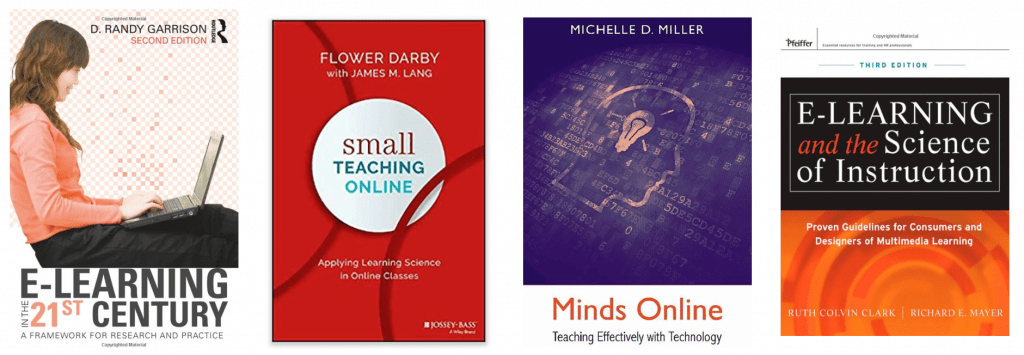There is a body of research underlying effective online learning (Clark & Mayer, 2011; Darby, 2019; Garrison, 2011; Miller, 2014).
A synthesis of some of the key findings suggests that the following attributes are important:
- Interaction
- Successful online courses are not simply a conglomeration of material and individual exercises.
- Online faculty members tend to spend significant amounts of time providing feedback, facilitating discussion, and modeling online involvement.
- Developing community through very intentional activities is time well spent.
- Engagement
- Not surprisingly, students who spend more time engaged with online materials/activities achieve at a significantly higher level.
- The US Department of Education report “Evaluation of Evidence-Based Practices in Online Learning: A Meta-Analysis and Review of Online Learning Studies” noted: “The meta-analysis found that, on average, students in online learning conditions performed better than those receiving face-to-face instruction.”
- Generally, students value the convenience and flexibility (logistics) of online learning but express concerns about reduced contact with peers and their professor, as well as a feeling of being overwhelmed as an individual.
- Students who are self-reliant with an internal locus of control generally are the better achievers in online courses.
- Monitoring student progress and intervening early when students need assistance can make a big difference in student retention and success.
- Not surprisingly, students who spend more time engaged with online materials/activities achieve at a significantly higher level.
- Instructional Design
- The quality of course layout / organization / navigation impacts learning.
- Communication of high-level expectations (student learning outcomes) and specific directions for assignments / activities is vital.
- A learner-centered approach to instructional design is more likely to generate student success and satisfaction.
- Alignment between objectives, learning content, and assessments is critical.
- Assessment
- Tools available in the online environment actually can help provide more assessment and quicker feedback to students than traditional paper-based, face-to-face activities.
- Frequent formative assessment and timely acknowledgement and feedback contribute to student success.
The following resources are well aligned with the best practices research outlined above.
Teaching Online is Different: Critical Perspectives from the Literature (2019)
Teaching in a Digital Age by Tony Bates (2015)
Applying the Seven Principles of Good Practice to the Online Classroom by Oliver Dreon (2013)
The QLT Rubric developed by California State University for evaluating online courses
Research Studies
Inflection Point: Educational Resources in U.S. Higher Education, 2019
Grade Increase: Tracking Distance Education in the United States (2018)

